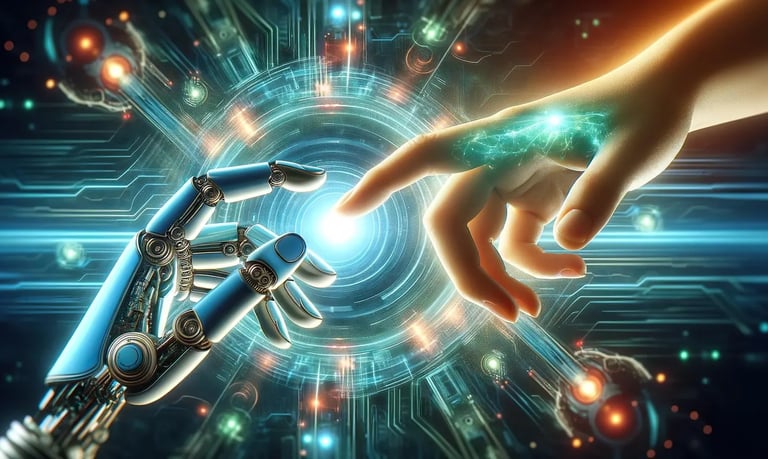AI and the Future of Work: How Artificial Intelligence is Transforming Jobs and Skills
SOCIAL


Discover how AI is transforming the future of jobs—creating new roles, reshaping skills, and driving a human-AI partnership for the modern workforce.
AI and the Future of Jobs: Disruption, Evolution, and Opportunity
Few technologies have had as big an effect on the workforce as artificial intelligence (AI). Whether it’s customer service chatbots, AI-driven medical scans, or machine learning in logistics, AI is reshaping industries faster than any innovation of the past century.
The big question many ask: Will AI take away our jobs?
The honest answer: AI won’t just replace jobs — it will transform them. It will automate repetitive tasks, create entirely new job categories, and redefine the skills humans need to thrive. The future of work isn’t humans vs. machines, but humans with machines.
According to the World Economic Forum, AI and automation are expected to disrupt around 85 million jobs by 2025, but simultaneously create 97 million new roles across industries. That’s not job elimination — that’s job evolution.
In this blog, we explore the impact of AI on the future of jobs, the new opportunities it is already creating, the skills workers will need, and how businesses can adapt to stay ahead.
The Rise of AI: Disruption or Opportunity?
AI brings something unique to the table: the ability to learn, predict, and execute tasks at superhuman speeds. From manufacturing floors to marketing campaigns, AI not only increases efficiency — it reimagines what’s possible.
Finance: AI algorithms spot fraud before humans notice patterns.
Healthcare: AI analyzes X-rays with higher precision than radiologists.
Retail: AI predicts what customers want before they even add it to their cart.
Agriculture: AI monitors crops, weather patterns, and irrigation automatically.
This AI revolution is not about elimination, but about augmentation. The jobs of tomorrow will require closer collaboration between human creativity and machine intelligence.
Jobs AI Is Creating Right Now
It’s easy to focus on what AI might replace — but let’s look at its job creation power. Already, entirely new professions have emerged:
AI Ethics Officers – guiding companies to build systems that are transparent and unbiased.
Prompt Engineers – specialists who design effective inputs to optimize AI system responses.
Digital Twin Designers – replicating real-world systems virtually for testing and innovation.
Healthcare AI Specialists – applying predictive diagnostics and AI-driven treatment planning.
AI-Augmented Creatives – artists, musicians, and storytellers using AI tools as partners in creation.
The keyword isn’t replacement. It’s a redefinition.
Jobs in the AI era will require critical human qualities machines cannot replicate: creativity, emotional intelligence, empathy, leadership, and ethical judgment.
From Repetition to Innovation: How AI Changes the Nature of Work
AI thrives in doing repetitive, rule-based, high-volume tasks: sorting resumes, scanning legal documents, or analyzing thousands of medical images. For humans, these processes were tedious and time-consuming.
But here’s the shift:
Recruiters can now focus on assessing cultural fit and human potential instead of sifting through 500 CVs.
Doctors can engage with patients more meaningfully while AI handles initial scans.
Marketers use AI to personalize campaigns at scale, freeing teams to innovate in storytelling.
This creates a new productivity model:
Human Creativity + Machine Intelligence = Exponential Outcomes
Skills for the Future Workforce in the Age of AI
As AI tools become a workplace standard, the most competitive professionals will be those who adapt their skills to thrive in hybrid human-AI environments.
1. Digital Fluency
Every industry — not just tech — will require basic AI literacy. Understanding automation, data analytics, and AI tools will become indispensable.
2. Emotional Intelligence (EQ)
AI can manage data, but it cannot replicate empathy, compassion, or human intuition. Leaders with high EQ will still be invaluable.
3. Adaptability
In a world where job roles evolve yearly, the ability to learn, unlearn, and relearn will far outrank static technical skills.
4. Critical Thinking and Ethics
Businesses embedding AI into decision-making need humans who ask: Is it fair? Is it safe? Is it ethical?
5. Creativity and Innovation
Machines can generate possibilities, but humans will remain the source of original imagination and bold ideas.
Industries on the Cusp of AI Transformation
AI is not limited to tech. It’s reshaping industries across the board.
Healthcare: AI aids in diagnostics, surgery planning, drug discovery, and patient care personalization.
Finance: Think robo-advisors, fraud detection, algorithmic trading, and risk management.
Retail and E-commerce: Predictive inventory, personalized shopping, AI-driven chat support.
Agriculture: Smart irrigation, precision farming, crop monitoring with AI-powered drones.
Logistics: Predictive maintenance, smart routing, and autonomous delivery networks.
Education: Personalized curriculums for students, adaptive learning systems.
Even creative fields like art, design, and writing are now infused with AI tools that help — not replace — human creators.
The Human Role in an AI-Driven World
The more AI systems influence decision-making, the greater the emphasis on human oversight and ethical frameworks.
We must ensure AI systems are:
Fair: Free from harmful bias.
Transparent: Clear in how decisions are made.
Accountable: With human checks in place.
Far from making human roles redundant, AI increases the importance of ethical thinkers, regulators, and leaders who ensure technology benefits society as a whole.
AI: The Future of Jobs by 2030
Predictions point toward a major but balanced transition:
85M jobs displaced but 97M jobs created by AI (WEF, 2025).
Roles blending human-AI collaboration (AI trainers, ethics managers, AI-product strategists) will dominate.
Industries like healthcare, logistics, and education will employ AI specialists in hybrid roles.
Demand for human-centered skills will keep rising — empathy, leadership, creativity, and innovation.
Final Thoughts: The Future is Collaborative
AI doesn’t signal the end of jobs. It signals the evolution of work. The real winners will be those who embrace collaboration between humans and machines.
If you’re a student: Start developing digital fluency, adaptability, and human-centered skills alongside technical knowledge.
If you’re a professional: Focus on upskilling into areas AI can’t easily replicate — leadership, strategy, and creativity.
If you’re a business leader: Don’t just invest in AI systems — invest in human talent and ethical governance to make AI adoption sustainable.
